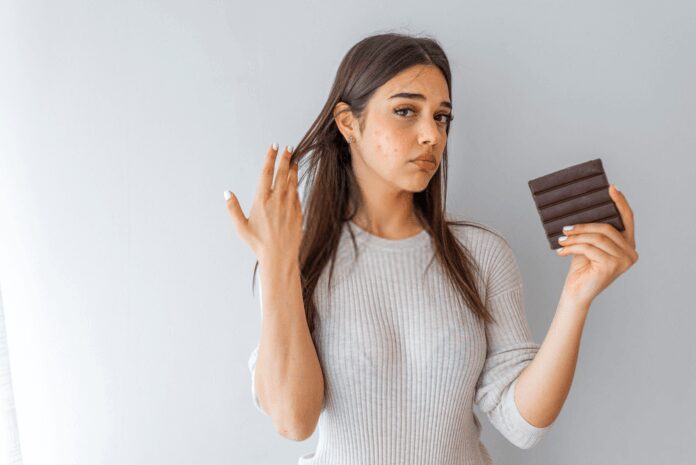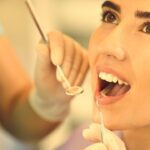If you don’t usually get acne, it’s easy to blame a random pimple on something equally strange. It could be because you ate too much cake the night before, took a 10-hour flight, or just finished a 65-hour workweek. Those temporary pimples are usually easy to figure out if your skin is usually smooth.
But what happens when those occasional pimples start showing up over and over again in the same place on your face? One falls off and another grows in its place. Sometimes two or three grow at the same time, even on opposite sides of the face. Well, it’s not easy to say that this type of acne was caused by stress or a change in routine.
But it can also be diagnosed, since it’s likely that these outbreaks are caused by a habit. Once you’ve found the most likely cause, you can take steps to stop it from happening again. You can often tell where a pimple is coming from by where it is on your face. It can be caused by a habit, a product for your hair or skin, or even your genes.
So, we talked to two skin doctors, Dr. Pippa Bowes, a dermatologist, and Dr. Dendy Engelman, a dermatologist and board-certified surgeon, to find out more about the different causes of acne on the face, based on where it usually shows up.
The cause of facial acne, depending on the location
Here are the most common places acne can show up on the face and what might be causing each one. If you have other kinds of acne, like maskne, bacne, or other types of body acne, make sure to take care of your hygiene and use non-comedogenic cleansers and moisturizers, clean sheets, and clothes that aren’t too tight.
T zone (forehead and nose)
Think of a big “T” on your forehead that goes across the top of your face and down your nose. This is the “T zone,” and people often think of it as a single area of the face because it naturally has the most oil. “This is because there are more sebaceous glands in the area, which makes it a common place for pimples and blackheads, especially for teenagers and people with oily skin,” says Engelman.
This is one reason why there are so many pimples in the T-zone: more oil means more clogged pores. However, Engelman says that hormonal changes and stress are often the real culprits.
Bowes says that thick or oily hair products, like masks or gels, can cause breakouts on the forehead: “Breakouts on the forehead can be caused by thick or oily hair products, like masks or gels. This is called “ointment acne,” and it usually goes away when you stop using the products that cause it.”
HOW TO STOP PIMPLES IN THE T ZONE
After using a gentle cleanser, Engelman says to use a skin-balancing toner. “If your skin gets oily during the day, pat it down with a blotter to soak up the oil,” she says. Use a chemical exfoliant up to three times a week to keep your skin in balance, reduce breakouts, lighten any spots you already have, and prevent acne scars. Also, it’s a good idea to switch out any oil-based hair products and wash your face with a cleanser after you shower to remove all of the comedogenic ingredients (found in shampoo and conditioner) from your face.
Around the mouth
Engelman says that there are different kinds of acne that show up around the mouth and get worse, and that hormones are often to blame for each of them.
- Comedones are small bumps on your skin that look the same as your skin.
- Papules and pustules are “medium-sized red spots that may be hardened (papules) or filled with pus (pustules).”
- Cysts are “large, painful lumps that fill up with blood and then pus.”
Bowes also says that topical steroids are often to blame. “This is periorificial dermatitis, and your doctor will need to treat it,” he says.
But your own dirty fingers are another common cause of this. “Oil and bacteria on the fingers can get on the skin of the face and cause acne,” says Engelman. “It can be expressively using our phones or products without thinking about it.”
HOW TO GET RID OF MOUTH ACNE
Engelman says that you should use noncomedogenic products on the area and not touch your face. You should also keep your hands clean, just in case. It also helps to use an acne treatment to get rid of any spots.
Brows and facial hair
Brow acne happens rarely, but it’s easy to figure out why: “It’s usually caused by a pore or hair follicle getting clogged with sebum, bacteria, or dead skin cells,” says Engelman. In other words, it’s a common type of acne that tends to show up near hair follicles (hence beard acne, too). Because a hair follicle is where folliculitis happens, any type of acne that happens near a hair is called folliculitis.
HOW TO GET RID OF ACNE IN THE EYEBROWS AND ON THE BEARD
The best way to fight folliculitis is to take care of your hygiene. Engelman says, “Make sure to wash and gently exfoliate your face every day and before waxing or trimming.” “Use a topical or spot formula to treat any spots.” And if you do use beard oil, make sure it contains non-comedogenic oils like argan, grapeseed, sunflower seed, hemp seed, or sweet almond to keep your beard soft and free of itching.
Jaw and chin
Engelman says that acne on the jaw is more common in women than in men, and that it usually looks like hard bumps that don’t get infected. “It can be a sign of an imbalance in hormones or stress that affects hormones,” he says. When women get acne on their jaws, it often happens around the time of their periods. Bowes says that diet can have a big effect on the chin.
HOW TO GET RID OF JAWS PORES
Since jaw acne is often caused by things inside the body, the best way to get rid of it is to keep your life as balanced as possible: eat well, get enough sleep, and so on. Now you know what to do to fix the problem: a gentle cleanser, toner, moisturizer, and spot treatments will help prevent acne damage and reduce its effects.
HOW TO STOP ACNE ON THE CHIN
“If it has to do with diet, it’s important to eat a healthy, balanced diet with lots of fruit and vegetables. “Get help if you think there is an underlying problem,” says Bowes.
Cheeks
Bowes says that acne that shows up on the cheeks can be caused by a buildup of bacteria. Buildup can happen on pillowcases, phones, and even your own hands. Also think about how clean your razor is. This will help you both when you shave and when you try to avoid (or be more careful) getting the razor close to the grains.
HOW TO FIGHT ACNE ON THE CHEEKS
Keep your hands clean, wash your pillowcases, clean your phone, and wear clean face masks. Long hair should be kept away from the face, and razor blades should be changed after 5–8 shaves or 2–3 weeks, whichever comes first.
Other reasons for acne
The location of a pimple can help you figure out what’s causing it, and it can also help you figure out why you’re getting pimples in the first place (this can also prevent isolated breakouts, and especially repeat breakouts).
Dr. Bowes gives a summary of the main reasons why people get acne below.
1. Genes: The tendency to get pimples is something you get from your parents (Thanks, Mom and Dad!). “Genetics are often to blame for the worst kinds of acne,” Bowes says.
Diet: Studies have shown for a long time that a high-glycemic index diet (high-sugar or high-carbohydrate diet) and a high-lactose diet are both linked to acne, says Bowes. “So limiting carbs, sugars, lactose, and highly processed foods can help fight acne. The advice here is simple: just try to eat a healthy, well-balanced diet.
Stress: Stress can show up in many ways, from not getting enough sleep to the mental strain of a breakup or work pressure. Bowes says, “It’s important to stop it by noticing the early warning signs and getting the help that can sometimes make a difference.” “As well as doing things like yoga and meditation on a regular basis to improve your health.” In short, take it easy and don’t get too stressed out.
4. Smoking: Acne is the last thing you should worry about when you smoke. But for what it’s worth, studies have shown that smokers have worse acne, and because their skin heals more slowly than non-smokers’, their pimples last much longer on their faces.
5. Poor hygiene: Poor hygiene does nothing but aggravate acne-prone skin . For example, a face that hasn’t been washed has a lot more oil and bacteria than one that has. A face that hasn’t been exfoliated has a lot more dead cells than a face that has just been polished. Also, keep your sheets, clothes, and towels clean. Wash your hands, change your razors, and keep your hair and scalp clean.




























